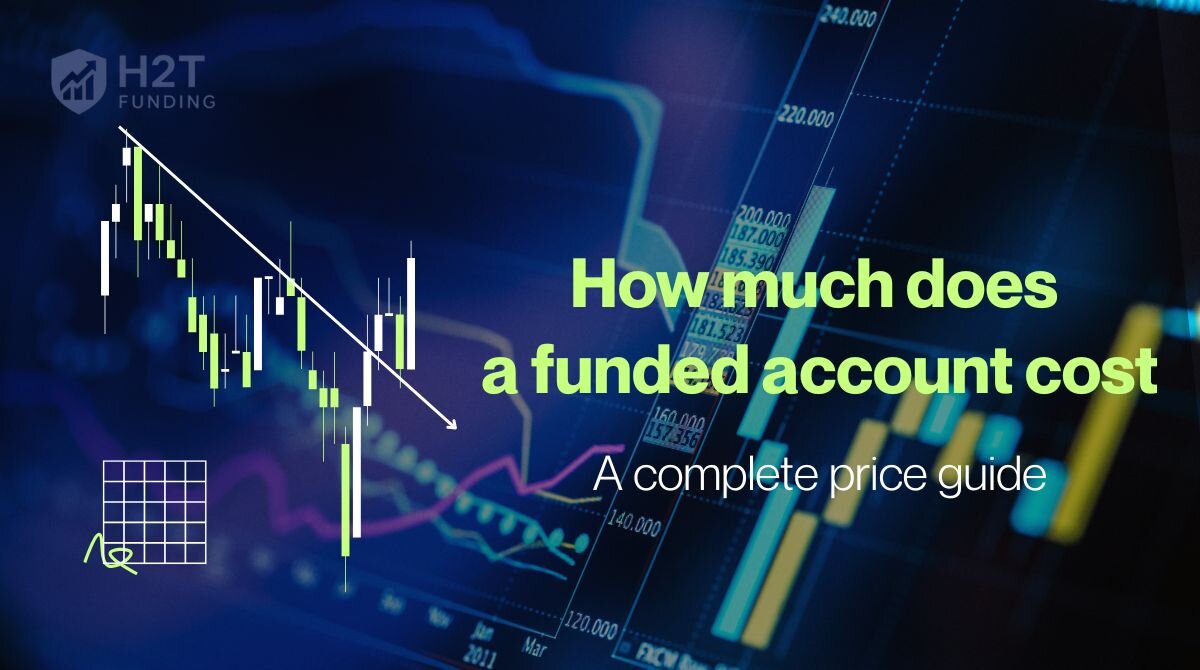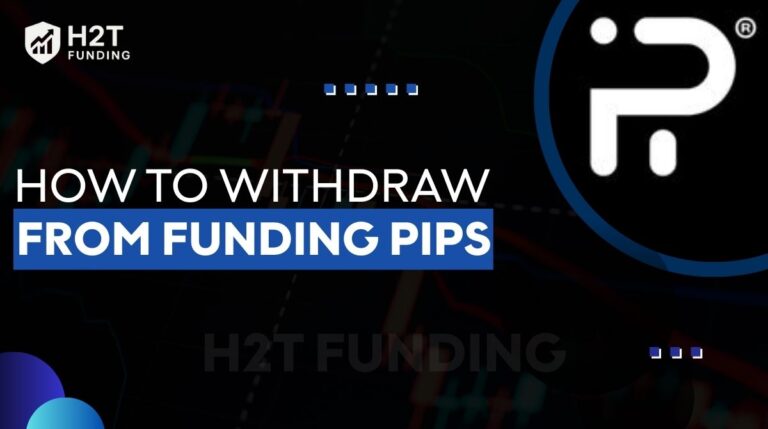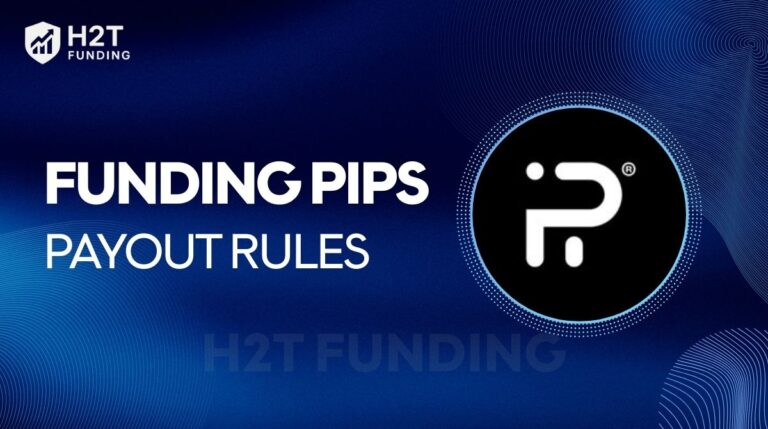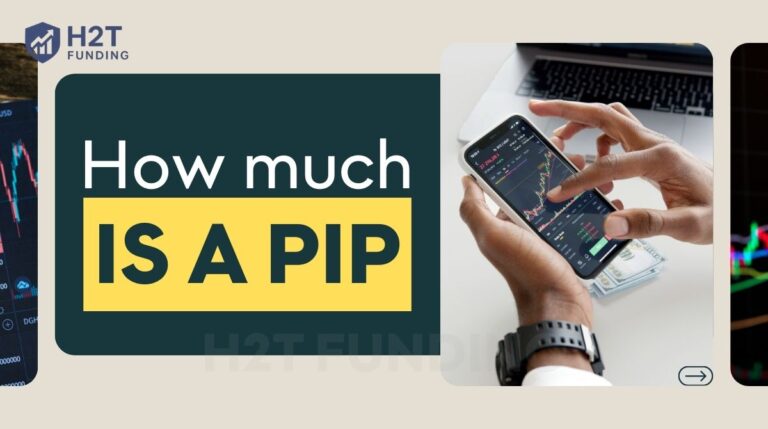How much does a funded account cost? The answer isn’t a single number; it’s a range, typically from $39 to over $600. The final price tag depends on the account size you’re aiming for, the firm’s evaluation model, and even whether the fee is refundable.
It’s easy to get lost comparing one-time fees, monthly subscriptions, and the fine print from firms like FTMO, FundedNext, or Funding Pips. This guide cuts through the noise.
We’ll break down every potential cost so you can confidently evaluate the real value of a funded account and choose a deal that truly matches your trading goals.
1. What is a funded trading account?
Think of a funded trading account as a partnership. A proprietary trading firm (prop firm) provides the capital, and you provide the skill. It enables talented traders like you to manage the firm’s money, providing you with the opportunity to earn a significant profit split (typically 70-90%) without risking your own savings. Crucially, if a trade goes against you, the firm covers the losses.
These accounts are typically granted after a trader passes an evaluation phase, where they must demonstrate profitability and risk control under specific conditions (such as drawdown limits and minimum trading days).
Once funded, traders can trade real market conditions with capital sizes ranging from $10,000 to $200,000 or more, depending on the firm and the plan selected.

Key benefits of funded trading accounts:
- No personal capital required: Traders don’t need to risk their own savings.
- Profit split model: Traders keep a large portion of the profits (often up to 90%).
- Access to significant capital: Scaling plans can increase account size over time.
- Structured risk limits: Firms provide clear rules to promote disciplined trading.
Whether you’re a retail forex trader or transitioning from demo trading, a funded account bridges the gap between skill and capital. For many, it’s a practical way to become a professional trader without needing tens of thousands in upfront investment.
Discover more: Easiest futures prop firm to pass
2. How funded accounts work: The typical process
So, what does the journey from applicant to funded trader actually look like? You’ll start by registering for an evaluation challenge. This is where you prove your skills by hitting specific profit targets while staying within the firm’s drawdown and risk rules.
If successful, the trader moves to a verification phase or directly to a funded account, depending on the firm’s model. At this stage, real capital is allocated for live trading.
Profits generated are split between the trader and the firm, commonly in ratios like 80/20 or 90/10. Traders must continue following strict rules to maintain their funded status.
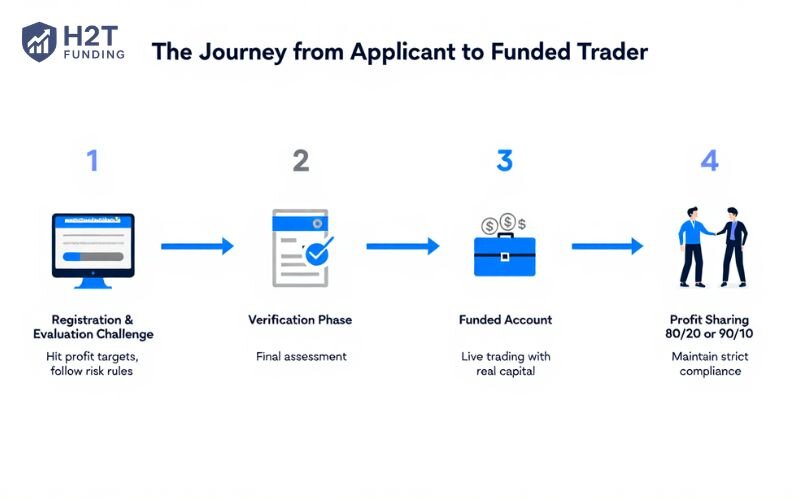
This process allows firms to assess skill and discipline before putting real money at risk, while giving traders access to larger capital pools than they might afford on their own.
3. The real cost of a funded account: A breakdown of all potential fees
Many traders assume the cost of a funded account is just a one-time payment. But if you’re asking how much a funded account costs, the answer is more complex. In reality, it often includes multiple components, some upfront, some recurring, and some hidden. Understanding these different fees is essential before committing to any prop firm.
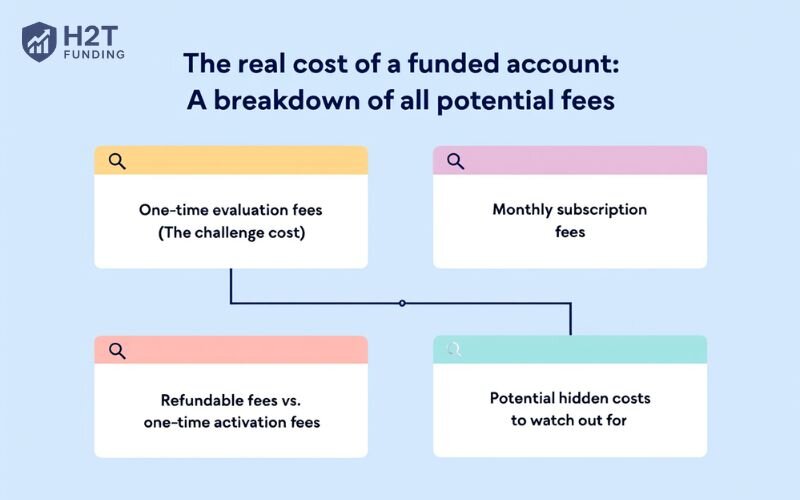
3.1. One-time evaluation fees (The challenge cost)
The challenge cost is the upfront fee traders pay to join a challenge or evaluation program. The amount depends on the account size and the firm’s reputation. For example:
- $85–$139 for a 10K account
- $250–$329 for a 50K account
- $500+ for a 100K account
These fees are typically non-refundable, meaning you don’t get your money back if you fail. However, some firms do refund this fee after you pass and start trading in a funded account.
3.2. Monthly subscription fees
Instead of a one-time challenge cost, some firms charge a monthly subscription. This model is popular among future-focused firms or one-step evaluations.
For example:
- Topstep charges approximately $165 per month for a $ 50,000 account.
- Some forex firms now offer hybrid models (small upfront fee + monthly maintenance).
While there’s no deadline pressure, these fees add up over time, especially if the evaluation takes several months.
3.3. Refundable fees vs. one-time activation fees
Some prop firms refund the evaluation fee once you pass and start trading, acting as a performance reward. FTMO and FundedNext offer this on certain account types.
In contrast, other firms may charge a post-challenge activation fee (e.g., $50–$150) after you’ve passed. This is often overlooked by traders and may not be clearly disclosed on the pricing page.
It’s essential to clarify with support whether your payment is:
- Fully refundable
- Partially refundable
- Or purely administrative and non-refundable
3.4. Potential hidden costs to watch out for
Even if the upfront cost looks fair, hidden charges can quietly erode your earnings or create account risk. Examples include:
- Platform/data fees: Especially in futures trading, it may cost $30–$80/month
- Inactivity fees: Some firms suspend accounts after 14–30 days of no trades
- Withdrawal conditions: Profit splits may only apply after 10 trading days
- Scaling fees or verification resets: Charged if rules are violated during scale-up or retry
Pro tip: Always read the full terms and conditions. A firm’s willingness to be upfront about these extra fees is a huge indicator of its reputation. Don’t be afraid to ask their support team directly about platform fees, inactivity rules, or withdrawal conditions before you commit.
Find out more related guides:
4. How much does a funded account cost? Price comparison of top prop firms
While most prop firms offer similar services, their pricing can vary significantly, especially across different account sizes and refund policies. To help traders compare more easily, I’ve compiled a side-by-side comparison of popular firms based on current pricing (as of mid-2026).
| Prop Firm | 10K Account Cost | 25K Account Cost | 50K Account Cost | 100K Account Cost | Fee Refundable? |
|---|---|---|---|---|---|
| FTMO | ~$167 (€155) | ~$270 (€250) | ~$373 (€345) | ~$583 (€540) | Yes |
| FundedNext (Stella 1-step) | N/A | $219 | $329 | $569 | Yes |
| The 5%ers (High Stakes Challenge) | $78 | N/A | N/A | $545 | Yes |
| Topstep (Trading Combine) | N/A | N/A | $49/month | $99/month | No (Subscription) |
| Funding Pips (1-step Challenge) | $99 | $199 | $319 | $555 | Yes |
Note: Topstep uses a monthly subscription model rather than a one-time challenge fee. Others like FTMO and FundedNext, refund fees after the challenge is successful.
Key takeaway: The cheapest challenge isn’t always the best deal. Use this table as a starting point, but make your final choice based on what aligns with your personal trading style, preferred markets (forex, futures, etc.), and the rules you’re most comfortable trading under.
5. Frequently asked questions (FAQs)
Yes. Most prop firms charge either a one-time evaluation fee or a monthly subscription to access their funding program. This cost covers your participation in the challenge or live trading setup.
A 25K account usually costs between $139 and $200, while a 50K account typically ranges from $199 to $329, depending on the firm and whether the fee is refundable.
Yes. Forex-focused prop firms like FTMO or FundedNext often offer more affordable evaluations than futures firms. However, fees can vary based on account size and leverage offered.
This is a crucial point: generally, no. The evaluation fee is for the opportunity to take the challenge, and it’s typically non-refundable if you fail. However, look out for firms that offer a free or discounted retry as a silver lining.
True free funded trading accounts are rare. Some firms offer free trials or demo-based competitions, but actual capital access almost always involves a paid evaluation or subscription.
The cost for a 100k-funded account typically ranges from one-time evaluation fees of $150 to $540, or monthly fees between $75 and $275. Prices vary between prop firms and depend on whether the fee is a one-time payment for a challenge or a recurring monthly subscription.
A 10k-funded account is one of the most affordable entry points into proprietary trading. For instance, Direct Funded Trader has offered a 10K Challenge for as low as $27 as part of a promotional offer. Other firms like FundingPips have prices around $66 – $199 for a 10k challenge account, sometimes with small discounts available.
The cost for a 200k-funded account is higher, reflecting the larger amount of capital provided. For example, Goat Funded Trader offers a 200k challenge for a discounted price of $509, with the standard price being $1,018. The specific cost can vary significantly between different prop firms.
6. Conclusion: Is a funded account worth the cost?
Ultimately, the answer to How much does a funded account cost? It is less about the price and more about the investment in your trading career. That investment can range from under $100 to over $600, shaped by the account size you choose and whether you opt for a one-time challenge fee or a recurring subscription.
While the upfront fee requires careful consideration, the access it provides to significant capital, a structured trading environment, and huge profit potential makes it a worthwhile step for many dedicated traders. The key is to look beyond the price tag and choose a firm whose rules and values align with your own strategy.
If you’re ready to take that next step, explore our in-depth reviews in the Prop Firm & Trading Strategies categories at H2T Funding. We’re here to help you build a solid plan for your trading journey.

